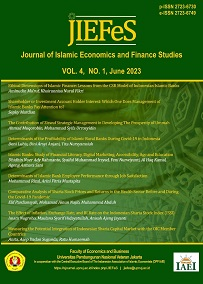Determinants of Islamic Bank Employee Performance through Job Satisfaction
DOI:
https://doi.org/10.47700/jiefes.v4i1.5923Keywords:
Employee Performance, Islamic Leadership, Job Satisfaction, Religious CultureAbstract
The Indonesian banking world is experiencing very rapid development, more and more new banks are popping up such as Islamic banks, so that business in the banking world is increasingly competitive. The research objective was to determine the effect of religious culture, and Islamic leadership on employee performance through job satisfaction. This research is causal associative research and examines the effect of intervening variables using path analysis. The research was conducted in 2022, from a saturated sample, a sample of 80 respondents was obtained. The results of this study are that religious culture and Islamic leadership partially have a significant effect on employee performance. Religious culture has no significant effect on job satisfaction. Islamic leadership has a significant effect on job satisfaction. Job satisfaction has a significant effect on employee performance. Religious culture has a significant influence on employee performance through job satisfaction. Islamic leadership has a significant influence on employee performance through job satisfaction. In the Sobel test, job satisfaction cannot mediate the relationship between religious culture and employee performance. Job satisfaction can mediate the relationship between Islamic leadership and employee performance. The implications of this research are that employees at Bank Syariah Indonesia feel high job satisfaction and have an understanding that working well for a living is worship. Leaders need to improve employee performance by implementing a culture of religiosity and increasing solidarity among employees to achieve optimal job satisfaction.
References
Addin, N. T. (2020). The Relationship Between The Leadership and Organitational Performance a Review. Decision Making and Appropriate Decision when Crisis Management View project. International Journal of Innovations in Engineering Research and Technology, 7(11), 1–10. https://www.researchgate.net/publication/346483351
Ajzen, I. (1991). The theory of planned behavior. Organizational Behavior and Human Decision Processes, 50(2), 179–211. https://doi.org/10.1016/0749- 5978(91)90020-T
Amelia, R. F., Febriani, R., & Sa’diyah, C. (2022). The Effect of Islamic Leadership on Employee Performance Mediated by Job Satisfaction. International Journal of Business, Economics and Law, 02(2), 58–68. https://doi.org/10.22219/jamanika.v2i04.23805
Andronicus, M., Sin, H. W., Stevanny, & Anggrainy, A. (2023). Effect of Financial Compensation, Job Satisfication and Discipline on Employee Performance. JIT, 17, 185–193.
Astuti, S. D., Shodikin, A., & Ud-Din, M. (2020). Islamic Leadership, Islamic Work Culture, and Employee Performance: The Mediating Role of Work Motivation and Job Satisfaction. Journal of Asian Finance, Economics and Business, 7(11), 1059–1068. https://doi.org/10.13106/jafeb.2020.vol7.no11.1059
Damianus, A., Luciano, A., Ubasa, A., & Magallanes, T. (2021). Attitude Management To cite this version : A new decade for social changes.
Davies, D. J., & Thate, M. J. (2017). Monstrosities: Religion, identity and belief. Religions, 8(6), 1–5. https://doi.org/10.3390/rel8060102
DDCAP group. (2019). Islamic Finance Country Index 2019. Global Islamic Finance Report 2019, 49–78.
Elrehail, H., Harazneh, I., Abuhjeeleh, M., Alzghoul, A., Alnajdawi, S., & Ibrahim, H. M. H. (2020). Employee satisfaction, human resource management practices and competitive advantage: The case of Northern Cyprus. European Journal of Management and Business Economics, 29(2), 125–149. https://doi.org/10.1108/EJMBE-01-2019-0001
Faraz, N. J., & Indartono, S. (2018). The mediation of frequent job on the effect of job fit, job satisfaction, on performance. Business & Management Review (Conference Proceedings), 9(4), 290–296. https://t2m.io/LoKG4Pxh
Harahap, S. (2016). Pengaruh Kepemimpinan Islami dan Motivasi Kerja Terhadap Kinerja Karyawan Pada PT . Bank Syariah Mandiri , Tbk. 3(2).
Indonesian Ministry of National Planning. (2020). Indonesia Islamic Economic Masterplan 2019-2024. Jurnal Ilmiah Ekonomi Islam, 6(3), 1–400.
Jamaludin, M., & Subiyanto, D. (2022). The Influence of Leadership Style, Organizational Culture, and Job Satisfaction on Employee Performance. Al- Kharaj : Jurnal Ekonomi, Keuangan & Bisnis Syariah, 5(4), 1711–1731. https://doi.org/10.47467/alkharaj.v5i4.1892
Jumaing, B., Haming, M., Sinring, B., & Dani, I. (2017). The Role of Mediation Morale: The Effect of Islamic Leadership and Emotional Intelligence on Employee Performance. IOSR Journal of Business and Management (IOSR-JBM), 19(10), 74–84. https://doi.org/10.9790/487X-1910037484
Karim, S. (2017). Hubungan Gaya Kepemimpinan Transformasional dan Religiusitas dengan Kinerja Karyawan. 2, 1–14.
Kornitasari, Y., Safitri, I. W., Wanakusuma, I., & Safitri, D. I. (2022). Peramalan Pertumbuhan Bank Syariah Indonesia Pasca Kebijakan Merger. 8(02), 1470– 1478.
Kuklytė, J. (2017). Islamic Leadership and Workplace Deviance: What Are The Interaction? Balkan Journal of Social Sciences / Balkan Sosyal Bilimler Dergisi ICOMEP, 212–221.
Lakis, V., & Baltušytė, D. (2018). Islamic Banking as an Alternative to Banks in the Western Countries. Ekonomika, 96(3), 73–89. https://doi.org/10.15388/ekon.2017.3.11571
Mahyarni, M. (2013). Theory Of Reasoned Action Dan Theory Of Planned Behavior. Jurnal EL-RIYASAH, 4(1), 13. http://ejournal.uin- suska.ac.id/index.php/elriyasah/article/view/17
Malik, M. S., Kamran Ali, Naila Kausar, & Muhammad Amir Chaudhry. (2022). Impact of Strategic Human Resource Management on Rule Breaking and Job Satisfaction: Moderating Role of Servant Leadership and Mediating Role of Rules Control. International Journal of Management Research and Emerging Sciences, 12(1), 76–86. https://doi.org/10.56536/ijmres.v12i1.192
Mappamiring. (2015). Effect of Cultural Organization, Leadership and Motivation of Work on the Performance of Employees (Studies in Islamic Banking in Makassar). International Journal of Academic Research in Business and Social Sciences, 5(12). https://doi.org/10.6007/ijarbss/v5-i12/1940
Mathew, G. C., Prashar, S., Ramanathan, H. N., Pandey, U. K., & Parsad, C. (2019). Impact of religiosity, spirituality, job satisfaction and commitment on employee performance: a quantile regression approach. International Journal of Indian Culture and Business Management, 19(4), 491. https://doi.org/10.1504/ijicbm.2019.104797
Mustapita, A. (2021). Socialization, Literacy and Implementation of Sharia Banking Products. Journal of Interdisciplinary Socio-Economic and Community Study, 1(2), 63–67. https://doi.org/10.21776/jiscos.ub.01.02.05
Omar, M. S., Rafie, N., & Ahmad Selo, S. (2020). Job Satisfaction Influence Job Performance Among Polytechnic Employees. International Journal of Modern Trends in Social Sciences, 3(14), 39–46. https://doi.org/10.35631/ijmtss.314003
Poba-Nzaou, P., Galani, M., & Tchibozo, A. (2020). Transforming human resources management in the age of Industry 4.0: a matter of survival for HR professionals. Strategic HR Review, 19(6), 273–278. https://doi.org/10.1108/shr-06-2020-0055
Puspitawati, N. M. D., & Atmaja, N. P. C. D. (2021). How Job Stress Affect Job Satisfaction and Employee Performance in Four-Star Hotels. International Journal of Applied Business and International Management, 6(2), 25–32. https://doi.org/10.32535/ijabim.v6i2.1168
Ridlwan, M., Purwandari, D. A., & Rahmat Syah, T. Y. (2021). The Effect of Situational Leadership and Organizational Culture on Employee Performance Through Job Satisfaction. International Journal of Multicultural and Multireligious Understanding, 8(3), 73. https://doi.org/10.18415/ijmmu.v8i3.2378
Robbie, R. I., & Sayyaf, R. T. F. (2022). Impact of Religiosity , Work-related Stress on Performance and Workload as Moderating Variable. International Journal of Social Science and Business, 6(2), 156–164.
Rodrigo, J. A. H. N., Kuruppu, C. L., & Pathirana, G. Y. (2022). The Impact of Job Satisfaction on Employee Performance: A Case at ABC Manufacturing Company. Asian Journal of Economics, Business and Accounting, January, 1– 9. https://doi.org/10.9734/ajeba/2022/v22i230541
Santya, I. M. M. D., & Dewi, I. G. A. M. (2022). Job Satisfaction: Its mediating Role in The Effect of Transformational Leadership and Organizational Culture on Employee Performance. International Research Journal of Management, IT and Social Sciences, 9(4), 569–586. https://doi.org/10.21744/irjmis.v9n4.2118
Streimikiene, D., Mikalauskiene, A., Digriene, L., & Kyriakopoulos, G. (2021). Assessment of the role of a leader in shaping sustainable organizational culture. Amfiteatru Economic, 23(57), 483–503. https://doi.org/10.24818/EA/2021/57/483
Sunanda, W. D. (2020). Pengaruh kepemimpinan islam dan religiusitas terhadap kinerja karyawan melalui kepuasan kerja karyawan sebagai variabel intervening (Studi kasus pada waroeng spesial sambal). Jurnal Ilmu Manajemen, 17(1), 20–36.
Suryani, T., & Triyono, R. (2019). The Influence of Organizational Culture , Islamic Leadership , Islamic Work Ethic on Organizational Commitment of Employee at Nahdlatul Ulama University Surabaya with Job Satisfaction as a Mediating Variabel. 117–130.
Undang-Undang Perlindungan Pekerja Migran Indonesia. (2017). Undang-Undang Republik Indonesia No. 18 2017 Perlindungan Pekerja Migran Indonesia. Pemerintah Indonesia.
Widianto, T., & Supriyono, S. (2018). Pengaruh Kepemimpinan Dan Budaya Organisasi Terhadap Kinerja Karyawan Bank Syariah Dengan Kepuasan Kerja Sebagai Variabel Intervening. ProBank, 3(2), 52–59. https://doi.org/10.36587/probank.v3i2.379
Wijayanti R, M. (2016). Pengaruh kepemimpinan islami, motivasi dan kepuasan kerja terhadap kinerja karyawan dengan lama kerja sebagai variabel moderating. Jurnal PPKM III, 3(3), 185–192.
Wikamorys, D. A., & Rochmach, T. N. (2017). Aplikasi Theory of Planned Behavior Dalam Membangkitkan Niat Pasien Untuk Melakukan Operasi Katarak. Jurnal Administrasi Kesehatan Indonesia, 5(1), 32. https://doi.org/10.20473/jaki.v5i1.2017.32-40
Yusuf, M. (2022). The Effect of Prophetic Leadership on Employee Work Motivation at The Islamic Higher Education. AL-TANZIM: Jurnal Manajemen Pendidikan Islam, 6(1), 195–206. https://doi.org/10.33650/al-tanzim.v6i1.3326
Zafar, M., Karim, E., & Abbas, O. (2017). Factors of Workplace Environment that Affects Employee Performance in an Organization: A study on Greenwich University of Karachi. Munich Personal RePEc Archive, 78822, 1–24. https://mpra.ub.uni-muenchen.de/id/eprint/78822%0A
Zahrah et al. (2019). The Mediating Effect of Work Engagement on the Relationship Between Person-Organization Fit and Knowledge Sharing. Journal of Applied Business and Economics, 21(8), 2017. https://doi.org/10.33423/jabe.v21i8.2587
Zaim, H., Erzurum, E., Zaim, S., Uluyol, B., & Seçgin, G. (2022). The Influence of Islamic Leadership on Work Performance in Service Industry: an Empirical Snalysis. International Journal of Ethics and Systems, August. https://doi.org/10.1108/ijoes-12-2021-0242
Downloads
Published
Issue
Section
License
Copyright (c) 2023 Mohammad Rizal, Arini Fitria Mustapita

This work is licensed under a Creative Commons Attribution 4.0 International License.
Authors who publish with this journal agree to the following terms:
- Authors retain copyright and grant the journal right of first publication with the work simultaneously licensed under a Creative Commons Attribution 4.0 International License that allows others to share the work with an acknowledgment of the work's authorship and initial publication in this journal.
- Authors can enter into separate, additional contractual arrangements for the non-exclusive distribution of the journal's published version of the work (e.g., post it to an institutional repository or publish it in a book), with an acknowledgment of its initial publication in this journal.
- Authors are permitted and encouraged to post their work online (e.g., in institutional repositories or on their website) before and during the submission process, as it can lead to productive exchanges, as well as earlier and greater citation of published work.

This work is licensed under a Creative Commons Attribution 4.0 International License.











